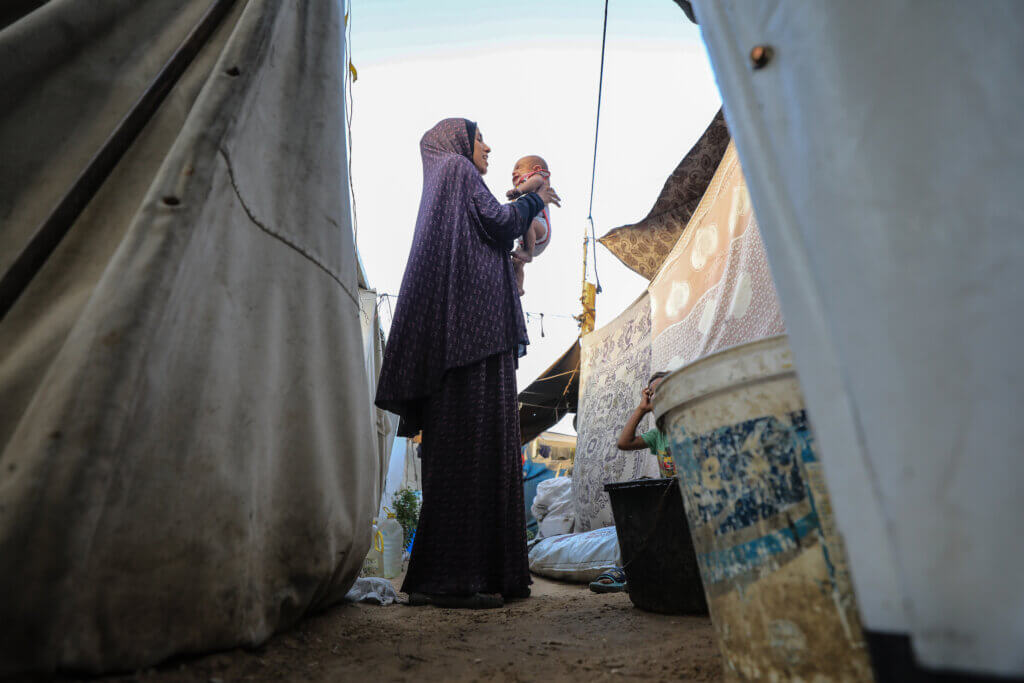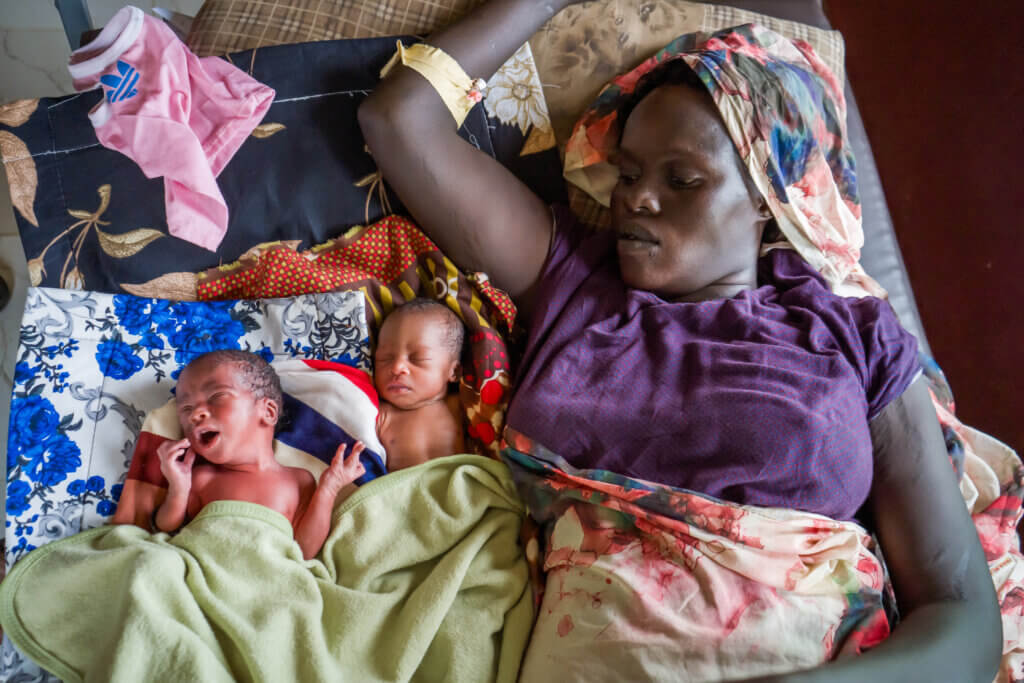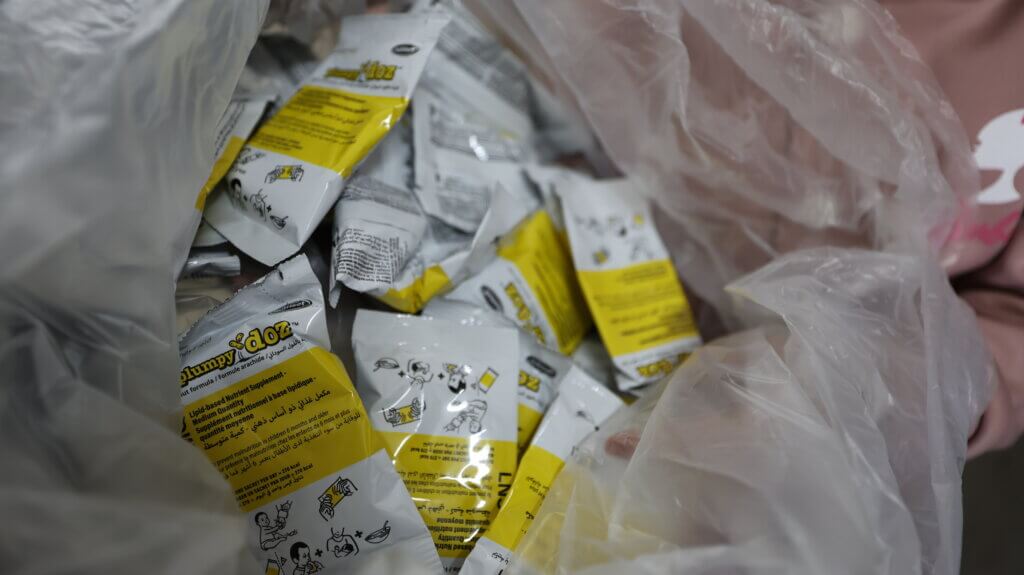HOW DOES HUNGER INTERSECT WITH SEXUAL AND REPRODUCTIVE HEALTH?

The global hunger crisis is continuing to worsen. In 2024, over 295 million people across 53 countries faced either acute hunger or famine, making it the sixth year in a row that global hunger rates have increased. In 2025, the rates of hunger are increasing due to conflict, forced displacement, climate extremes, and more.
In parts of Sudan, famine has been officially confirmed with 25.6 million people suffering from acute food shortages, and 756,000 facing catastrophic conditions. Gaza has also become a flashpoint for global hunger, accounting for the largest share of people living in famine conditions worldwide.
But as we’ve seen time and time again, crises hit women and girls the hardest—and acute hunger is no exception. Women and girls are more often the ones to eat last and least, and the impacts of hunger can be uniquely dangerous for pregnant women. Without adequate nutrition, pregnant women face significantly higher risks of complications such as anemia, preeclampsia, stillbirths, miscarriages, gestational diabetes, and mental health challenges. Their babies are also at increased risk of being born prematurely and in need of advanced medical care to survive.
Hunger is intrinsically tied to sexual and reproductive health—and that’s exactly why UNFPA, the United Nations sexual and reproductive health agency, is working tirelessly to provide support to women, girls, and new mothers surviving acute hunger crises.
Famine Confirmed: 500,000 People Facing Crisis Levels of Hunger in Gaza

After nearly two years of conflict, famine has confirmed declared in parts of Gaza. Every single person in the area is currently hungry. Half a million people in Gaza are facing catastrophic levels of hunger that are so severe, they can starve to death at any moment. Tens of thousands of those facing severe or catastrophic levels of hunger are young children, pregnant women, or breastfeeding mothers.
Since the aid blockade began in March 2025, 57 children have reportedly died from malnutrition, including at least 20 newborns who died on their first day of life. Severe malnutrition is currently affecting 40% of pregnant and breastfeeding women in Gaza, increasing the risk of fatal complications and contributing to the 300% increase of miscarriages and childbirth complications.
15% of babies who are born in Gaza right now need intensive care—but between the destruction of hospitals, fuel shortages, and infant formula shortages, this care is vanishing rapidly. And in the next year, it’s estimated that 71,000 children and more than 17,000 mothers will need urgent treatment for acute malnutrition.
It is nearly impossible to carry a healthy pregnancy in Gaza right now.
One doctor in Gaza, shared with us how these statistics translate into real-life tragedies:
“I treated a woman who had struggled with infertility for nearly seven years. She finally became pregnant during the war, but due to the impacts of the siege, a lack of proper nutrition, and the trauma of bombardment when she was forced to flee, she went into premature labor and lost her baby.”
One new mother in Gaza, Roozan, shared how hunger impacted her first few months of pregnancy: “There was no food other than duqqa (a spice mix). Even milk wasn’t available – no pasteurized milk, no powdered milk. I tried to replace what I could with supplements, although they were hard to find.”
As the crisis worsens with no end in sight, more newborns, pregnant women, and new mothers will continue to die or face lifelong complications from malnutrition-related causes in Gaza.
25 Million People Face Acute Hunger In Sudan

After over two years of war in Sudan, the country is facing the largest humanitarian crisis in the world. 11 million people have been displaced in and around Sudan, and more than half of the population (approximately 25 million people) are facing acute hunger. This total includes a staggering 4.9 million people under the age of five, and 1.2 million pregnant and breastfeeding women.
The hunger crisis in Sudan has grown so severe that it is now among the top four countries facing global acute malnutrition. Famine has been declared in ten areas throughout the country, and thousands of people are at immediate risk of either starving to death or dying from hunger-related diseases.
Malnourished pregnant women are facing weakened immune systems and higher risks of pregnancy complications and infections. They are also giving birth to babies who are likely to be severely underweight, which can greatly increase their risk of dying in infancy or can lead to lifelong health challenges.
One displaced woman, Lubna, shared this plea with us: “How could I guarantee the safety of my unborn child, my six children and myself. Who will help me in these terrible circumstances?”
Hunger also leads to an increase of violence against women as tensions rise. With food and resources flowing primarily into the hands of men and boys, women and girls can be forced to engage in transactional sex to get access to food and other essentials.
In Sudan in particular, over 12 million people are considered at risk of gender-based violence, including widespread sexual violence against women and girls. Violent practices such as child marriage and female genital mutilation have seen an increase in response to families going hungry and soaring poverty.
How UNFPA Addresses Hunger Among Women and Girls

Proper nutrition is an essential part of sexual and reproductive health. Here are some ways that we’re working to support women and girls facing hunger.
In some crisis situations, we provide nutritional supplements like vitamin A, iron folate, and others to pregnant women, breastfeeding mothers, and newborns. These supplements help combat the increased risk of anemia and other life-threatening complications, even when food cannot be accessed.
In Gaza, our traveling midwifery teams, and health clinics distribute nutritional supplements to women and girls facing severe malnutrition and anemia. One UNFPA mobile health team worker shared this with us after making several house visits to a malnourished mother and her small children:
“She looked pale, skinny, and weak,” the worker said. “We went back to visit her for several weeks in a row to check on her. Finally, she looked healthier.”
Esraa, a displaced pregnant woman in Sudan who was battling hunger, also received lifesaving micronutritional support from a UNFPA mobile health team. Thanks to the team’s immediate support and follow-up visits, Esraa was able to recover from severe malnutrition and give birth to a healthy baby boy.
Reflecting on the support, Esraa told us: “They not only helped me with medical care but also gave me a sense of safety and hope that I hadn’t felt in months.”
Another way that UNFPA supports women and girls facing hunger is by offering cash and voucher assistance to people in crisis situations so they can purchase food and other essentials even when prices skyrocket. In 2024, we distributed $12.6 million in cash and voucher assistance to 155,000 people facing humanitarian emergencies.
In certain emergencies, such as Haiti, UNFPA has also partnered with food distribution agencies to provide emergency food kits to pregnant and breastfeeding women alongside our standard Dignity and Mama Kits. We also work closely with organizations such as the World Food Program and UNICEF to ensure that pregnant and breastfeeding women and newborns have access to the nutrition they need, no matter what.
These efforts have contributed to our ability to avert 39,000 maternal deaths and safely deliver 825,400 babies in humanitarian crises in 2024 alone. To learn more about our global impact for women and girls across every sector of our work in 2024, click here to view our latest annual report.